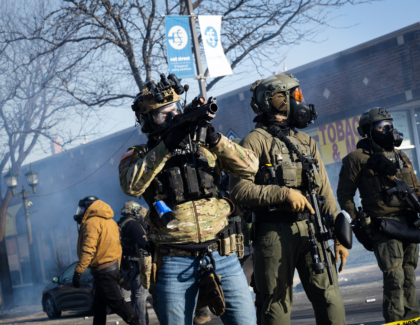Sign up for the daily CJR newsletter.
An attorney has a civil case that’s about to go to trial. He contacts a friend of his, the editor of a local publication, to encourage coverage of the case. The attorney shares public court records and information about the court schedule. The case is newsworthy, and on the eve of trial the editor’s publication runs a story that outlines the claims of the attorney’s clients.
And for this … the attorney deserves to be sanctioned for frivolous conduct?
That’s how one Ohio judge sees it, although plenty of people, it should go without saying, disagree. An appeal is underway, and a coalition of civil liberties and media groups, including the Ohio Newspaper Association, the Ohio Association of Broadcasters, and the Ohio Coalition for Open Government, has filed an amicus brief arguing that the judge used the wrong standard to impose the sanctions. The First Amendment Lawyers Association has filed a separate brief arguing that the sanctions were unconstitutional. And—full disclosure that I’m hardly a neutral commentator here—I’m the lead author of a third brief, for the ACLU of Ohio, arguing that the sanctions could restrict the rights of attorneys to communicate with the press.
Those arguments are now before the Ohio Eighth District Court of Appeals, which is reviewing the trial judge’s ruling. The case grows out of a lawsuit against the Chagrin Falls-based English Nanny & Governess School, which trains nannies and places them with clients. Attorney Peter Pattakos, of the Chandra Law Firm in Cleveland, initiated the suit on behalf of a former student and a former employee of the school. The student, a nanny in training, alleged that the school covered up a report she made about a client sexually abusing his own daughter. The employee alleged that she was fired because she refused to help discredit the student.
Local news coverage and court filings describe what happened next: A few times during the representation, Pattakos communicated with the editor of Cleveland Scene, the alternative newsweekly. He provided the editor, a friend of his, with public court documents related to the suit, including the complaint, the briefs opposing a summary judgment motion, and the affidavits supporting the motion. Pattakos also encouraged the editor to report on the case when it was set for trial. Notably, none of the documents was under seal, and no gag order had been issued to the parties or their counsel. The court proceedings, too, were open.
Scene published a story on the first day of jury selection that characterized the claims against the school, prompting the judge to question the jurors about the coverage. Two said they had seen the headline but would not be influenced by it. Soon thereafter, the judge declared a mistrial for unrelated reasons. Eventually, a new jury was selected, the trial was held, and Pattakos’s clients won their case.
A few months later, however, the school’s attorneys asked the judge to sanction Pattakos for his “involvement in the publication of an inflammatory article related to this case.” The judge complied and ordered Pattakos to pay nearly $11,000, covering the cost to the school of questioning the jurors after the article’s publication and of bringing a sanctions motion.
The court’s reasoning about ‘frivolous conduct’
When I first read the trial judge’s order imposing sanctions, a couple of things surprised me. To begin, the vanilla nature of Pattakos’s communications with the editor. As described and quoted in the order, Pattakos doesn’t rant and rave about the school or dramatize his clients’ allegations. He said in one instance that the case might be interesting to Scene, and in another that he was preparing for trial, which was set to begin soon. At times he discourages coverage, and then, with opening statements approaching, he encourages it. “Get your reporting pants on,” he says at one point, in what’s probably the most colorful line.
That’s it.
I was also surprised by the absence of a gag or sealing order. I kept waiting to discover one as I reviewed the docket, thinking it must be buried in some extraneous record, perhaps in a footnote, but there was nothing of the sort—no such order Pattakos had violated. So, essentially, the judge sanctioned Pattakos for urging an editor to report on a public trial and for providing said editor with public court records.
Importantly, the judge sanctioned Pattakos under an Ohio statute governing “frivolous conduct in filing civil claims.” It covers “the taking of any … action in connection with a civil action” and states:
… any party affected by frivolous conduct may file a motion for award of court costs, reasonable attorney’s fees, and other reasonable expenses incurred in connection with a civil action … The court may assess and make an award to any party to the civil action … who was adversely affected by the frivolous conduct.
Under that statute, “frivolous conduct” is defined to include “[that which] obviously serves merely to harass or maliciously injure another party to a civil action … or is for another improper purpose, including, but not limited to, causing unnecessary delay or a heedless increase in the cost of litigation.”
The judge found that Pattakos’s “involvement in publication of the Scene article was a malicious attempt to injure and was intended to harass each of the defendants,” reasoning that Pattakos had known that “the thrust of any reporting was likely to be to discredit the defendants and that, if believed by members of the public, the reporting would injure them.” The judge also found that “soliciting news … coverage once trial began served no purpose of achieving an orderly or fair adjudicative process or settlement.”
At the same time, the judge dismissed the relevance of the state’s attorney-conduct rules. One of them, about trial publicity, expressly permits attorneys to disclose information “contained in a public record” or related to “the scheduling or result of any step in litigation.” As described by the court, all of the information Pattakos provided to Scene met those criteria. But the judge said the attorney-conduct rule wasn’t at issue and that Pattakos could be sanctioned under the state’s separate frivolous-conduct statute.
A troubling precedent
Here’s where the trial judge’s ruling gets especially troubling. The frivolous-conduct law contains no language regarding extrajudicial attorney speech, and I’m unaware of any other Ohio case in which a court—of any kind, at any level—has imposed sanctions under that statute for such speech. Instead, the statute has been used to sanction attorneys and parties solely for their litigation practices, such as pursuing claims that lack support.
As a practicing lawyer myself, I know that some restrictions on attorney speech are necessary to preserve the adjudication process, and the courts have well-developed systems and principles for keeping sensitive information confidential.
But, generally, attorneys may speak to the press and public as long as their speech doesn’t create a substantial likelihood of materially prejudicing a proceeding in which they’re involved. Protecting that right isn’t just about attorneys’ personal freedom or speech, or their ability to represent their clients as they see fit. The implications here are significant, because attorney speech—to journalists in particular—plays a key role in the proper functioning of the legal system. As my amicus brief points out:
[T]he constitutional guarantees of speech and press contemplate the importance of the public’s meaningful inclusion in court proceedings and the right to receive information about those proceedings, generally with the effect of enhancing the integrity and quality of the adjudication process—all in a modern media environment in which journalists and their sources, including attorneys, typically supply the information as surrogates of the public.
If upheld, the trial judge’s novel use of the frivolous-conduct statute will create a precedent that could make attorneys wary of any but the most trivial interactions with the press. That outcome would restrict the public’s practical ability to receive information about court proceedings—and undermine the principle that “free and robust reporting, criticism, and debate” about court proceedings, as Justice Brennan once wrote, “can contribute to public understanding of the rule of law” and improve the legal system’s quality “by subjecting it to the cleansing effects of exposure and public accountability.”
I hope the appeals court agrees.
Has America ever needed a media defender more than now? Help us by joining CJR today.






